#Armand de Caulaincourt
Text
24 notes
·
View notes
Text
Il neigeait. L'âpre hiver fondait en avalanche.
Après la plaine blanche une autre plaine blanche.
On ne connaissait plus les chefs ni le drapeau.
Hier la grande armée, et maintenant troupeau... ❄️
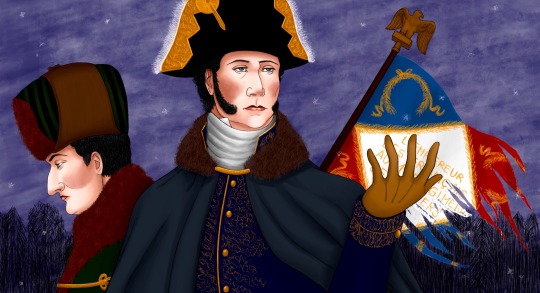
A drawing I made for a good friend of mine depicting Armand de Caulaincourt and emperor Napoleon during the tragic retreat of the Grande armée from Russia in the year 1812. 🇫🇷💔
#count’s drawings#art#history#napoleon#napoleon bonaparte#emperor napoleon#napoleon i#armand de caulaincourt#caulaincourt#napoleonic era#napoleonic wars#premier empire#19th century
33 notes
·
View notes
Text
A peculiar napoleonic entourage.
Some drawings I made for the modern!Napoleonic AU with my gf.
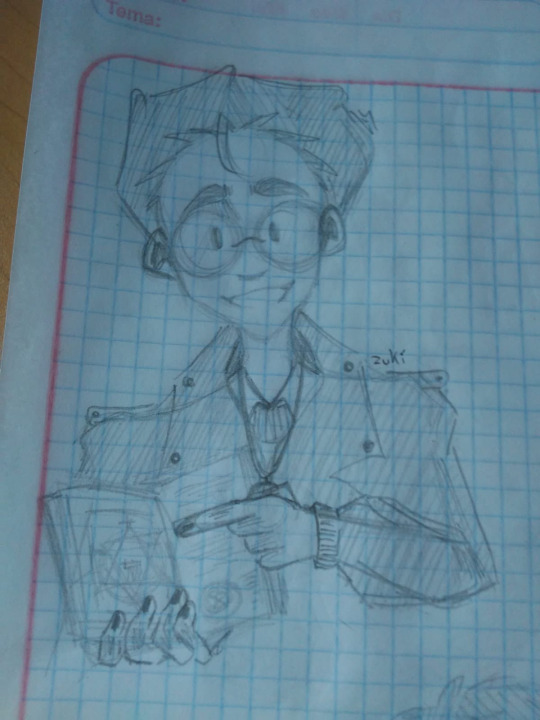
Monsieur de Méneval. He's a good guy. Kind of the Sire's pet, but he's nice.
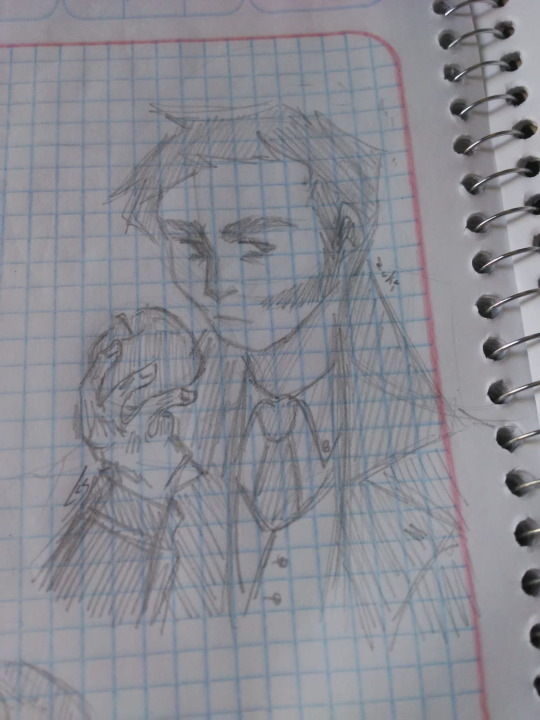
Monsieur de Caulaincourt! This time he's not balding. However, he's got a temper, be careful!

The kind Grand Marshal of the Palace; Gérard Duroc. He's very gentle, his stuffed bear "Armand" isn't tho.

The emperor's sweet bodyguard; Roustam Raza. Kinda looks like a big baby. Perhaps he is.
I know I'm missing a lot of them, if you wish, you could ask me to do some. Hugs!
#roustam raza#claude francois de meneval#armand de caulaincourt#gerard duroc#napoleonic era#modern au
21 notes
·
View notes
Text
Napoleon found that his friendships with men often began with physical attraction, and this took a curious form. ‘He told me,’ says Caulaincourt, ‘... that for him the heart was not the organ of sentiment; that he felt emotions only where most men experience feelings of a different kind: nothing in the heart, everything in the loins and in another place, which I leave nameless.’ The feeling Napoleon described as ‘a sort of painful tingling, a nervous irritability... the squeaking of a saw sometimes gives me the same sensation.’
Source: Vincent Cronin, Napoleon Bonaparte: An Intimate Biography
#I CAN’T BELIEVE THIS IS A REAL QUOTE#Caulaincourt#Armand Augustin Louis de Caulaincourt#Vincent Cronin#Cronin#napoleon#napoleonic era#napoleonic#napoleon bonaparte#Napoleon bio#quote is also in ‘No Peace with Napoleon’#first french empire#19th century#french empire
255 notes
·
View notes
Text
(A while ago @apurpledust mentioned wanting to know more about Duroc's children, so here's what information I have)
Duroc and his wife, Maria de las Nieves Martínez de Hervas, had two children, both of whom died tragically young. (Hervas left instructions that her gravestone should be engraved with "To the unhappiest of mothers".)
Their first child, Napoléon Louis Sidoine Joseph Duroc, was born on 24 February 1811 in Paris. Named for the emperor and his two grandfathers (Claude Sidoine de Michel du Roc and José Martínez de Hervas), he lived for just over fourteen months. The infant’s health was never good; Duroc wrote to Bertrand in March 1812 that “[Hervas] is doing well but her son has been and always is ill”. (As Duroc’s biographer Danielle Meyrueix notes, when writing of his wife and child he habitually referred to “her son” rather than “our son”. Perhaps not the most engaged of fathers.) Napoléon died on 6 May 1812 at Maidières in Lorraine. The architect Pierre Fontaine, noting in his journal that Hervas had asked him to design a tomb for her lost son, wrote that the child had been “a few days older than the King of Rome and destined to enjoy at that prince’s side all the favor with which the Emperor honored his father.”
Their daughter Hortense Eugénie Nieves Duroc was born on 14 May 1812, eight days after the young Napoléon’s death. (In a letter, Duroc implied that the news of the boy’s death had been kept from Hervas, who was in Paris, to avoid imperiling her health.) Named for her godmother, Hortense de Beauharnais, she was baptized in January 1813 alongside the duke of Bassano's daughter. After Duroc’s death in May 1813, Napoleon transferred the duchy of Friuli to her, writing to Hervas that Hortense would be “assured of my constant protection”. He also remembered her in his will, leaving her a large sum of money and recommending, in one last attempt at matchmaking, that she marry Bessières’s son, the duke of Istria. Hortense’s aunt wrote in 1823 that “Hortense is perfectly sweet, she’s a rare child for her spirit and intelligence, who her poor father would have been happy to see so fine in all respects”. She died of pneumonia on 24 September 1829 after three days of illness, aged seventeen.

A 1933 biography of Charles-Nicolas Fabvier (Hervas’s second husband) identifies this painting by Jeanne-Elisabeth Chaudet as a young Hortense Duroc. It was sold at an auction a few years ago with the title “Young Embroideress”, so either the sitter’s identity has been lost since then or it may never have been Hortense at all.
Duroc’s long liaison with the dancer Emilie Bigottini may also have resulted in at least one child. Felix Bouvier, writing a biographical sketch of Bigottini in 1909, claimed that “children were born of this irregular union, a daughter and a son named Odilon”. However, Odilon (full name Pierre Dominique Jean Marie Odilon Michel du Roc), born in 1801, was the son of Duroc’s cousin Géraud Pierre Michel du Roc, the marquis de Brion. On Duroc’s death, Napoleon made Odilon a page in the imperial household. (This may have given rise to Bouvier’s claim, as it seems to have confused people at the time. Caulaincourt had been tasked with sorting out Duroc’s affairs, including a substantial amount of money for Bigottini, and Duroc’s sister Jeanne implied that he had gotten the wrong impression from one of Duroc’s requests: “On the subject of the allowance for little Odilon, M. the duke of Vicenza was misled…he took a step which pained me very much”.) As for the daughter, all I’ve been able to find so far is a remark from Laure Junot that “It was known that the count Armand de Fuentès had had a daughter with Mademoiselle Bigottini, and that Duroc was in the same position”.
46 notes
·
View notes
Text
Okay I'm officially transferring that twitter draft over to Tumblr;
Here's my list of: Napoleonic figures as Love Live! characters!!!
Some of these are quite accurate some other ones are mostly random, well, here it is, shout-out to like maybe 2 people who will see this who are both Napoleonic Era and Love Live! fans
Napoleon - Setsuna Yuki
I just feel like she matches his vibe particularly when he was younger

Joachim Murat - Karin Asaka to slay literally and figuratively

Davout - Hanayo Koizumi their room is a fucking mess, does not know how to talk to people, please just be their friend

Bessières - Emma Verde idk how to explain, she just matches his vibe

Suchet - Lanzhu Zhong demanding yet it pays off in the form of success

Soult - Eli Ayase very strict disciplinarian
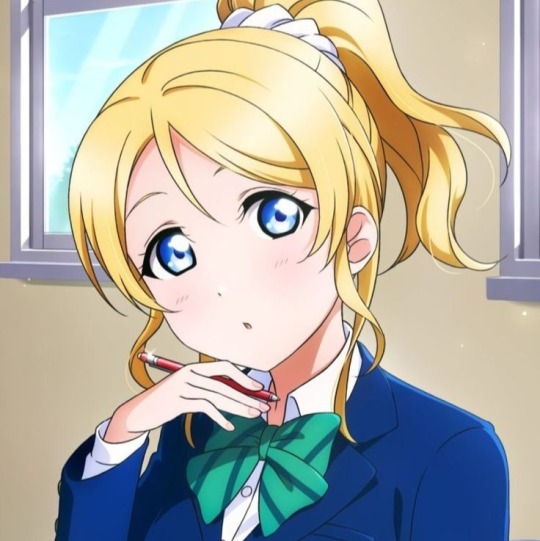
Lannes - You Watanabe very reliable, loves their friends a lot, if you ask them if they're okay more than once in one go they'll start thinking abt it too much and either start crying or speedwalk away awkwardly

Alexander I - Riko Sakurauchi oooooo you have homosexual feelings ooooooo

Armand de Caulaincourt - Maki Nishikino ooooooo you have homosexual feelings ooooooooo

Jean Andoche Junot - Yoshiko Tsushima batshit insane

I ran out of space for images!!! (posting from mobile) So I will continue in a reblog, hang in there friends: I'm not done yet ^-^
#napoleonic#napoleonic era#napoleons marshals#napoleonic wars#napoleonic shitpost#napoleon bonaparte#napoleon#rhodo rambles
8 notes
·
View notes
Photo
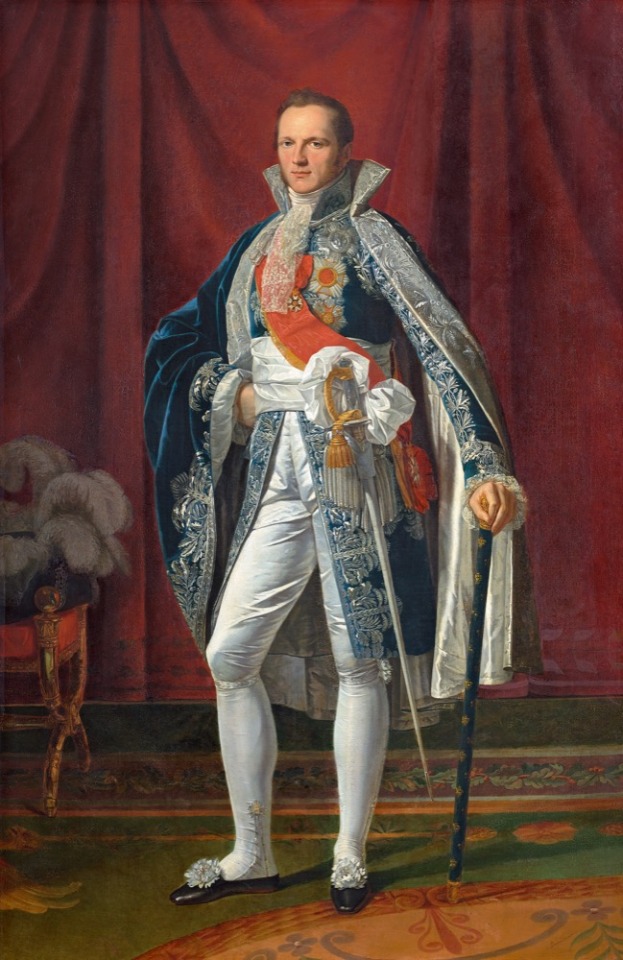
Armand-Augustin-Louis de Caulaincourt (1773–1827) in attire of "Grand Écuyer" (Grand Esquire). By Féréol Bonnemaison.
#Féréol Bonnemaison#french aristocracy#full length portrait#french empire#empire français#full-length portrait#imperial aristocracy#souvenirs du duc de vicence#caulaincourt
2 notes
·
View notes
Text
Ney talks too much
From the »Souvenirs« of Marshal Macdonald: On April 4, 1814 Napoleon first sent Ney, Caulaincourt and Macdonald to the tsar with an offer to abdicate in favour of his son Napoleon II. Alexander welcomed the negotiators in a friendly manner and treated them with an obligatory speech praising the valour of the French army and in particular its marshals.
When he had ceased speaking, Marshal Ney first rose to address him, and said some good things and many useless ones; we wanted to stop him; he said to us briskly in a dry tone: "Let me speak; you will have your turn." The Duke of Vicenza was seething with internal anger; it would have been better if he had answered, as he knew better the proper forms and had more moderation.
… and most likely would not have snubbed his fellow emissaries in front of the tsar like that. I just love to picture Caulaincourt choking while trying to swallow his anger, while Macdonald probably mouthed an inaudible »We’re sorry, please ignore him!« to the tsar behind Ney’s back.
62 notes
·
View notes
Text

"I told you that if you didn't stop losing Russia and dying all over, I would turn this carriage around and go home! Now get in!"
#napoleon#bonaparte#Napoleon Bonaparte#Emperor Napoleon I#Emperor Napoleon Ier#Napoleon I#Napoleon Ier#Caulaincourt#Marquis de Caulaincourt#Armand de Caulaincourt#Russia#Russian Campaign#turn this carriage around#Napoleon did a thing#that time
53 notes
·
View notes
Text
Now there is nothing for it but abdication.
All that could be done had been attempted. It was a marvel that, after the disastrous campaign of Leipzig, the Emperor had been able to resist the invaders for three months. The time was come to make peace, and if Napoleon was an obstacle to it, he must be persuaded to withdraw. The enthusiasm of the soldiers was for the dispirited and disillusioned generals only a warning that there might be difficulties with the army, still so susceptible to the magical influence of its great leader. Ney, who had saved the remnant of the Grand Army amid the Russian snows, led his raw battalions of young troops on field after field in Germany, and taken such a prominent part in the obstinate struglle on the soil of France itself, was now foremost in declaring that all was over. “It is only an abdication that can get us out of this,“ he said.
It was agreed that a deputation of the marshals should wait upon Napoleon after the review. It needed some courage to beard the lion. The Emperor was in a desperate position, and might take a desperate course. He was quite capable of arresting the marshals and sending them before a court martial, for he felt he could count on the soldiers still, whatever the leaders might say. Ney, always ready to take risks, offered himself as spokesman of the deputation. Two of the elder marshals joined him, Lefebvre, Duke of Dantzig, and Moncey, a veteran of the armies of Spain, now 60 years of age, who had commanded the National Guard of Paris on the day of the Allied attack, and who was to show next year on the occasion of Ney’s trial that his moral courage was as great as the soldierly resolution he had so often displayed in the field.
Napoleon had gone back to the palace, and was with Berthier, Bassano, Caulaincourt, and Bertrand, in his study, when the three marshals asked for an immediate audience and entered the room almost before a reply could be given. There was an awkward pause. Then Ney asked the Emperor if there were any news from Paris. Napoleon, though he had just heard from Caulaincourt of a hostile vote of the Senate, answered that he had no news of any kind. Then Ney said that he himself had bad news from the capital. The Senate had declared for the abdication of the Emperor. Napoleon showed no surprise, but quietly pointed out that this was beyond the powers of the Senate, and a matter for the vote of the whole nation. “As for the Allies,“ he said, “I am going to crush them before Paris.” Ney protested that further military operations were now hopeless, and at this point Lefebvre supported him. “It is a pity,” said Ney, “that peace was not made sooner. Now there is nothing for it but abdication.” Napoleon still remained calm. He began to argue about the military possibilities of the situation. He counted up the forces at his command about Fontainebleau, and those he could summon from other parts of France. The Allies, he said, could not maintain themselves with a large army at Paris. He would cut them off from their communications, and the first success he won would be the signal for a widespread rising against the invaders. The marshals listened in stony silence. Berthier and the others said not a word in support of the Emperor’s plea to be allowed one more throw of the deadly dice of war. They were of Ney’s opinion.
While Napoleon was thus arguing to deaf ears, Macdonald and Oudinot entered and reported the arrival of their army corps. The Emperor hoped that they would support him, and spoke of the projected march on Paris. But they sided with Ney. “I declare to you, “ said Macdonald, “that we do not mean to expose Paris to the fate of Moscow. We have taken our decision, and are resolved to make an end of all this.” Once more Napoleon argued that the struggle could be resumed with good hope of victory, and finally declared that, notwithstanding the contrary opinion of the marshals, he would attack Paris. Ney interrupted him. “But the army will not march on Paris,” he said. For the first time Napoleon raised his voice, and looking the Marshal in the face said to him: “The army will obey me!” “Sire,” replied Ney sternly, “the army will obey its generals.”
It was a declaration of war. The two men stood face to face. The others looked on silently, expecting an outburst of anger from Napoleon. But after a pause he resumed his calmer tone, and asked the Marshals to withdraw and leave him alone with Caulaincourt.
A. Hilliard Atteridge - Marshal Ney, the Bravest of the Brave
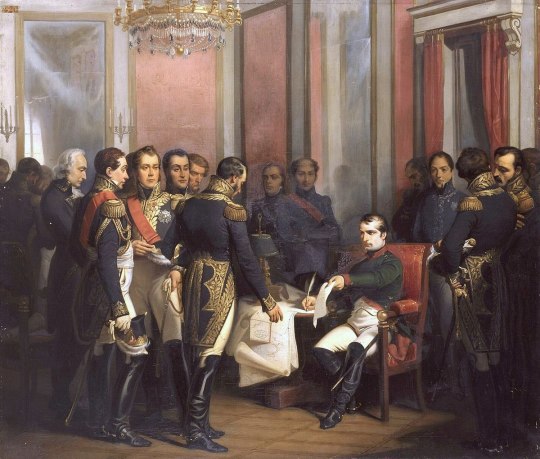
#napoleonic#a.hilliard atteridge#marshal ney: the bravest of the brave#the first abdication of napoleon#napoléon bonaparte#michel ney#françois joseph lefebvre#bon adrien jeannot de moncey#louis alexandre berthier#armand de caulaincourt#henri gatien bertrand#bassano#étienne macdonald#nicolas oudinot#the marshals vs napoleon#we were weary#the army will obey its generals#we are resolved to make an end of all this
36 notes
·
View notes
Photo
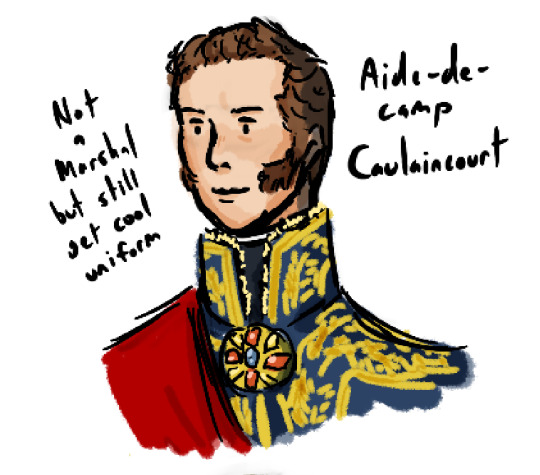

I wanted to draw a not-marshal this time
#napoleonic#history art#french history#armand-augustin-louis de caulaincourt#aide-de-camp#i need to do more research on him :(
22 notes
·
View notes
Text
“In less than two months’ time,” the Emperor said to me, “Russia will be suing for peace. The great landowners will be terrified, some of them ruined. The Tsar Alexander will be in a very awkward position, for at heart the Russians care nothing for the Poles, certainly not enough to face ruin for their sakes.”
To avoid being contradicted, the Emperor delivered a rapid fire of questions and of the answers that he wished to hear, preserving meanwhile the appearance of urging me to reply, and continually asking me—without giving me the chance to get in a word—whether I did not think as he did.
When he had done speaking, my silence angered him. He wanted a response that would strengthen his preconceptions. . . .
—General Armand de Caulaincourt, With Napoleon in Russia
55 notes
·
View notes
Text
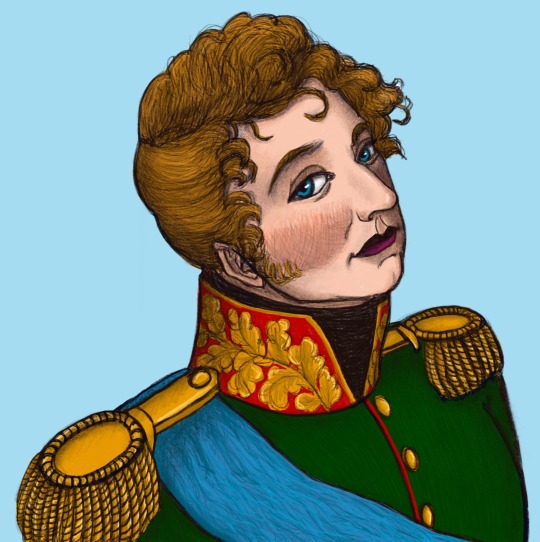


Soooo I’m a little bit at a loss and just simply try to post… something, I guess??? 😂
Few drawings from the past year which I still adore!
The first one represents count Michail Andreevich Miloradovich, one of the bravest and most restless generals of the Russian Empire during Napoleonic wars. 🇷🇺🇷🇸🇺🇦 ✨
The second one shows Dominique-Jean baron Larrey, famous french field surgeon. 🇫🇷🩸
And in the third picture we have the one and only Armand Augustin Louis marquis de Caulaincourt, french general and diplomat who served twice as french ambassador in Saint-Petersburg. 🇫🇷✒️🗡
#count’s drawings#art#miloradovich#general miloradovich#dominique-jean larrey#armand de caulaincourt#napoleonic wars#russian empire#french empire#first empire#19th century
41 notes
·
View notes
Text
"Because of this disgusting Roustam, I failed to shoot a single bird."
Again from Roustam's memoirs, Roustam writes about his experience with Imperial pistols… and the Emperor's frustration at not knowing how to use them.
The Emperor entrusted me with the care of all his weapons. He even had a subordinate on hand who cleaned and set up the guns and sometimes even traveled with us. He and I would always put a couple of pistols in His Majesty's saddle pocket, so that on the way the Emperor could hunt birds if he wanted to. It happened, however, because of the shaking, the pistols failed, which became the cause of unpleasant conversations. Each time this happened, the emperor blamed me for this.
The palace armorer, Monsieur Le Page, adapted a small safety catch that had to be pressed before aiming. I explained to His Majesty how to use this device, and he found it very ingenious.
We were in Berlin at the time. One morning, after breakfast, Bonaparte mounted his horse to go for a walk, accompanied by senior officers. We passed a wide field full of crows. The emperor ran quickly forward, drew his pistol and fired. But as he did not press the safety catch, no shot was fired. He threw away his pistol in anger and, brandishing his whip, rushed at me. I was among the officer's entourage, but seeing him so angry, I hurried to run, and he chased me. However, realizing that he had no intention of stopping the chase, I stopped. He started to scold me. I wanted to explain to him why the gun was not fired, but he turned around, went up to the highest military commanders and began to make excuses:
— Because of this disgusting Roustam, I failed to shoot a single bird.
I picked up the gun from the ground and fired into the air to make sure he was wrong. The stable boy also checked the gun and said that the gun was indeed in order. As I was very upset, even General Rapp came up to me and said a few words of comfort:
— Don't be angry, Roustam, you know how temperamental the emperor is, but he loves you.
The next day, Bonaparte reminded me of yesterday:
— Well, my fat magician, will you continue to take care of the weapons or…?
— I always watch my weapons and never elude my duties, sir.
He didn't answer, but after that he always used the safety catch and never failed.
And even though the stablemaster was convinced that I wasn't to blame for anything, he tried to inflate this little incident into a big story and even suggested that the person responsible for the gun be fined. Naturally, I asked him what prompted him to be so strict. If he wants my assistant to become more circumspect, then there is no point, because he is already extremely conscientious. I said even more:
— And if, Duke, you decide anyway that someone must pay a fine, let it be me.
And after all this, Caulaincourt gave no rest to my poor assistant, who came to see me without understanding what they wanted from him. I comforted the poor man by explaining to him that even if there was a mistake, it was only my fault, for before I gave the weapon to the emperor, I finally examined it. I had to go once again to the Marquis de Visans and remind him that it would be extreme cruelty to demand a fine from my poor assistant, and that was the end of the issue.
Source.
#Roustam Raza#Napoleon Bonaparte#general rapp#Armand de Caulaincourt#Napoleonic Wars#napoleonic era#memoirs#fat magician?? lol!
20 notes
·
View notes
Text
Rites of Peace: The Fall of Napoleon and The Congress of Vienna (Adam Zamoyski)
Rites of Peace: The Fall of Napoleon and The Congress of Vienna (Adam Zamoyski)
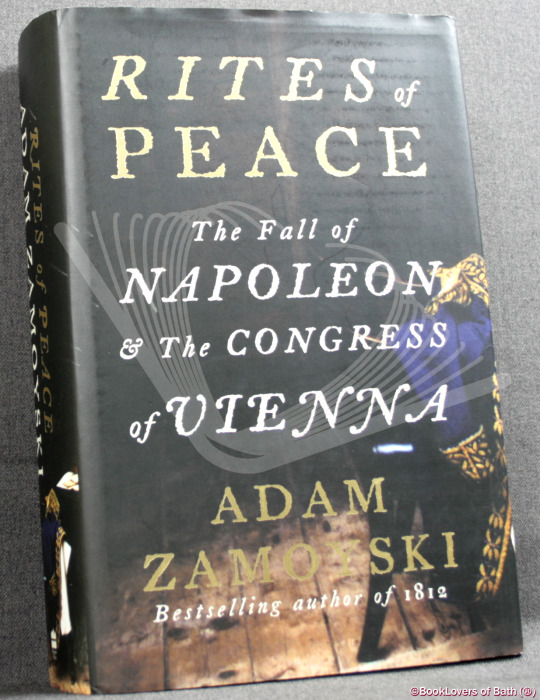
Rites of Peace: The Fall of Napoleon and The Congress of Vienna (Adam Zamoyski) soon to be presented for sale on the first-class BookLovers of Bath web site!
Published: London: HarperPress, 2007, Hardback in dust wrapper.
Contains: Colour photographs; Maps; Photographic end papers & blanks;
From the cover: In the wake of his disastrous Russian campaign of 1812, Napoleons imperious grip on Europe…
View On WordPress
#9780007197576#armand de caulaincourt#baron august von hardenberg#books written by adam zamoyski#confederation rhine#congress of vienna#congresses#count charles nesselrode#diplomatic history#first edition books#government history#habsburg#lord castlereagh#metternich#napoleonic wars#politics history#reconstruction of europe#treaty of paris#tsar alexander i russia
1 note
·
View note
Text

In 1805, on his way to Milan to receive the Italian crown, Napoleon allowed himself "two days off between two crowns" and stopped in Brienne, to see the places of his childhood again.
One morning, while riding a horse in the middle of the countryside, he suddenly left the company behind him, rushed through fields and forests, then disappeared. There is panic among the officers. Where has the Emperor gone?
After three hours of fruitless search, Caulaincourt had the idea of firing a pistol in the air, which did not fail to bring Napoleon after a few minutes.
"He approached them laughing, happy that he, the master of 40 million men, had been his own for three hours."
Source. (Note: I translated this from French so it may not be 100% accurate)
#Armand-Augustin-Louis de Caulaincourt#Napoleon Bonaparte#Napoleon#french history#napoleonic era#napoleonic wars#la grand armee
70 notes
·
View notes